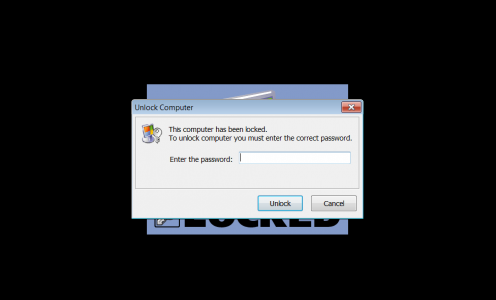Warning: Don’t let scammers lock you out of your PC!
If you own a computer, be careful not to inadvertently let fraudsters gain access to your device. Scammers can ask you to install programs that hold your computer and its data hostage unless you cough up a fee.
One Aussie took it to the social news website Reddit to warn others after a relative fell victim to the scheme.
They said: ‘Yesterday, my father-in-law was targeted by scammers. Unfortunately, he initially fell for it and gave the scammers access to his computer. Fortunately, he was stopped before he lost any money, but this morning he found his computer was locked.’
In the comments, the Redditor explained that their father-in-law’s bank came to the rescue when their computers flagged the activity on his account as odd. The bank blocked all transactions after confirming that he was not behind the requests. But then, the ordeal was not done – a password suddenly prevented him from accessing his device.
After the father-in-law contacted the user’s partner, they went and cleaned up the computer, removing any remote access trojans, which refers to any malware that allows scammers to control devices from far away, as well as any potentially unwanted programs. However, they missed the program responsible for locking out the father-in-law from their computer.
The software in question, called ‘Lock My PC’, is legitimate and legal for use. Thankfully, FSPro Labs – the developers behind the program – caught wind of the modus operandi after receiving multiple reports of misuse. They promptly issued a solution that became helpful in the Redditor’s case.
The Aussie shared it on Reddit for good measure: ‘For anyone else caught in a similar situation, there is a straightforward solution if the program the scammers used is Lock my PC. At the password prompt, type “999901111”. It will display a numerical code. Go to the Lock my PC recovery page and type in the numerical code to receive a recovery password. Type the password in, unlock the computer and uninstall Lock my PC.’
Redditors collectively sighed in relief after knowing that the father-in-law’s money was safe. One said: ‘This is a low-tech version of ransomware. Good job finding the solution.’
The scheme was not as sophisticated as other known attempts, partly due to the termination of the utility tool Syskey in Windows 10. Fraudsters exploited the feature to encrypt sensitive data and ask for money from victims in exchange for regaining access to their devices.
However, scammers found a workaround in Lock My PC, a program created in good faith. It previously allowed users to prevent unauthorised access to their computers.
To prevent more instances of fraud, the developers made the program’s download link unavailable to the public. Existing customers can still use the software, but future users must sign up with their corporate email.
The original poster said about their father-in-law: ‘On the plus side, he's a bit wiser now. I think the next time he gets a phone call from “Brian from Microsoft”, he'll have the guy on the phone for a couple of hours while he f**ks him around.’
Others were all for scammers having a taste of their own medicine. A Redditor said: ‘I had them call me the other day and I felt like annoying them. I just asked them what the scam was, Windows support? Amazon parcel? Tax bill? Do you want me to let you into my computer or buy you iTunes or Google Play cards? Well? They hung up at that point.’
Another user shared: ‘Have you watched any scam baiters on YouTube like Kitboga? They often go along with the scam slowly in a funny way that wastes hours of the scammers’ time only to get it to the point where they turn off their voice modulation and call them out angrily as scammers. They can also act so ridiculous that the scammer catches on, yells at them and hangs up.’
A third chimed in: ‘It's good to watch Jim Browning on YouTube to avoid being scammed in the first place. It's become fun when they call me and I ask them to ask their supervisor if they know who Jim Browning is. We all have a good laugh and they hang up.’
Kitboga and Jim Browning are content creators and internet vigilantes who engage with scammers to waste their time and then expose them to the public, hence the term ‘scam baiting’. They may even use trojan horses and remote administrative tools to shame online crooks and teach them a lesson.
Occasionally, scam baiters also produce educational content that helps people detect fraud attempts. See this video by Jim Browning explaining why you should never let anyone access your computer remotely:
While scam baiters serve a purpose in that they can be entertaining, educational, or both, others are not so keen on internet vigilantism.
Replying to the original poster who said his father-in-law knows better now, one said: ‘He's not wiser. Their entire life is stealing from vulnerable people, they're filth, and if you piss them off, nothing stops them from harassing you until you change your number.’
It can be tempting to play along and exact revenge when a scammer contacts you. However, they can retaliate by harassing you for weeks or even months! Remember, these swindlers still engage in criminal activity and hold sensitive information about you. Even scam baiters like Kitboga and Jim Browning assume aliases to protect themselves.
If you ever find yourself being asked through the phone to enable remote access, just hang up. Scamwatch warns that scammers can pretend to be employed by well-known companies and promise to fix your computer and offer free upgrades. If it is already too late, the next best thing is to contact your bank. The Australian Cyber Security Centre also urges victims to report to the authorities. The agency has more resources here if you need help.
Need a laugh after this serious discussion? Watch Kitboga prank a scammer accessing his computer while using Windows 95. Are they smart enough to notice that Kitboga is using an outdated operating system? Let’s find out!







